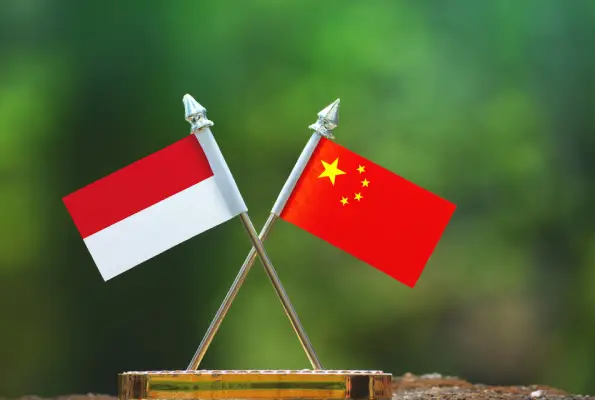The Xi Jinping government hosted its fifth Belt and Road Initiative (BRI) Summit in Hong Kong on October 17–18, 2023. It was a historic occasion honouring the tenth anniversary of the start of BRI in 2013.
Over 130 countries sent representatives to the summit this year. One prominent guest was President of Indonesia Joko “Jokowi” Widodo, who was joined by State-Owned Enterprises Minister Erick Thohir, Foreign Affairs Minister Retno Marsudi, and Trade Minister Zulkifli Hasan.
During the summit’s opening remarks, Jokowi emphasised the value of partnerships that benefit both parties and the long-term viability of projects.
Afterwards, he proceeded to Beijing for the Indonesia-China Business Forum, where he announced several new investment agreements centred on green development. When BRI first started, it was noticeably lacking in “greenspeak.” It is currently the preferred adjective to characterise Chinese investment in Indonesia.
But in reality, how eco-friendly are Chinese investments?
Indonesia: BRI’s Crown Jewel
Under Jokowi’s leadership, the growth of infrastructure and the economy have been highlights of China-Indonesia ties. China is currently Indonesia’s second-largest investment partner and its biggest commercial partner. A 2021 AidData study indicates that it is also among the top beneficiaries of BRI funding.
On the fringes of the Belt and Road Initiative (BRI) summit, Jokowi met with Chinese President Xi Jinping, who praised the newly opened Jakarta-Bandung fast train as a BRI “golden brand.” Given that the two nations are currently debating expanding the project to Surabaya, it is undoubtedly one of the most well-known investments made as part of the BRI.
In addition, Xi pledged support for developing sectors such as electric vehicles (EVs), photovoltaic (PV) solar energy, and the digital economy. Furthermore, he advocated for “a regional comprehensive economic corridor” to facilitate a more thorough integration of industrial supply chains.
Jokowi, along with 31 Indonesian firms and Minister of Trade Thohi, announced during the Indonesia-China Business Forum in Beijing that eleven new investment transactions totalling USD 12.6 billion were signed during the visit. According to reports, these expenditures will go toward developing EV batteries, renewable energy, and healthcare.
This follows the announcement during Jokowi’s most recent visit to China in July 2023 of a significant USD 11.5 billion investment in quartz sand processing, an essential first step in the growth of a homegrown PV solar industry.
Emphasis On Green Development
Due to increased scrutiny on the environmental sustainability of investments undertaken under the Belt and Road Initiative, green development was a major topic of discussion in the run-up to the Beijing summit.
Since 2019, China has been pushing a more environmentally friendly version of the Belt and Road Initiative (BRI), but some analysts are unsure if this goes against the principles of green growth. For example, each year, fossil fuel power facilities sponsored by the Belt and Road Initiative contribute about 245 million tons of carbon dioxide.
The Chinese government declared in 2021 that it will no longer be constructing new coal-fired power facilities abroad. However, research indicates that up to 86% of China’s financing for energy projects in Indonesia is directed toward the establishment of coal-fired power plants via the China Export-Import Bank (CHEXIM) and the China Development Bank (CDB).
Furthermore, the Belt and Road Initiative (BRI) is still investing in the construction of captive coal-fired power plants, which provide localised power-generating capabilities for certain industrial projects.
The construction of a 4×380 megawatt coal power station on Obi Island in North Maluku is one such project. Local nickel smelters will be powered by this joint venture between Harita Group of Indonesia and Lygend of China.
This is noteworthy in the Indonesian context because, to assist Indonesia extract more value downstream from its natural resources, the Jokowi administration has prioritised foreign investment in industrial projects, particularly energy-intensive nickel smelters.
A lot of projects involve social and environmental costs in addition to emissions, particularly nickel smelters, which frequently contaminate the surrounding environment and depend significantly on foreign labour.
For example, it has been reported that activities at the Morowali Industrial Park, the epicentre of the nickel industry in Indonesia, have caused surplus coal reserves to be washed into the sea by precipitation, turning saltwater black. Green investments require greater accountability.
Jokowi’s participation in the BRI Summit underscores Indonesia’s growing dependence on China to provide funds for a fair and equitable energy transition. On the one hand, Chinese investment is opening doors for the growth of domestic PV solar and electric car manufacturing. This could hasten Indonesia’s transition to clean energy sources as well as its economic growth. However, the costs of these investments to society and the environment are growing.
China must take greater steps to guarantee that its BRI investments are transparent, do not harm the environment, and do not negatively impact people. It’s also necessary to make explicit the complaint procedures for impacted populations.
To draw in green investment from foreign partners, the Indonesian government must more clearly define the social and environmental standards and be steadfast in enforcing them. It must also exercise greater discernment in selecting industrial projects that will enable it to maintain its carbon emissions in a downward trajectory. Rather, the divisive omnibus bills that were enacted in 2020 undermined environmental safeguards and protections.
Accountability must be enforced by civil society organisations and local communities. It won’t be simple to do this. It is becoming more difficult to distinguish between ethical and unethical green deals since green language has become ingrained in the language of contemporary economic diplomacy.



